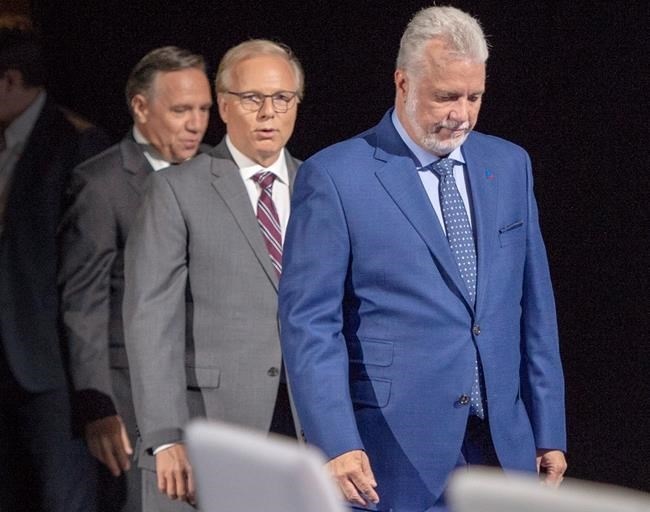
Liberal Leader Philippe Couillard, right, PQ Leader Jean-Francois Lisee and CAQ Leader Francois Legault arrive for the photo session before their English debate Monday, September 17, 2018 in Montreal, Que.
Image Credit: THE CANADIAN PRESS/Paul Chiasson
September 18, 2018 - 8:30 AM
MONTREAL - In an election campaign where Quebec independence is not a defining issue, party leaders held an historic English debate Monday and tried to woo roughly one million anglophones who have traditionally voted overwhelmingly for the federalist Liberals.
All four leaders spoke about the importance of Quebec's anglophone minority, despite the fact a mini-controversy erupted in the province about the fact the televised debate was even going to take place.
Francois Legault, leader of the Coalition Avenir Quebec, which is leading the polls, said the Oct. 1 election is unlike previous ones in the province.
"I want to build a strong Quebec within Canada," Legault said, explaining the position his party has taken to be a federalist alternative to the Liberals and a nationalist alternative to the Parti Quebecois.
"You're no longer forced to choose between Quebec and Canada, the PQ and the Liberals," Legault added. "On the one side, the old and tired Liberal government; on the other my party — which will bring about positive change."
While the debate themes were targeted to the province's anglophone minority, such as access to the labour market for English-speaking youth, the election campaign's hot-button theme of immigration quickly surged to the forefront.
Liberal Leader Philippe Couillard, responding to a debate question from an anglophone refugee from Nigeria, said, "the way we talk about immigration and immigrants is not always positive."
"It's distressful the way you speak about immigrants," he said directly to Legault, whose party wants to expel immigrants who fail to pass a French test after three years in the province.
"Immigrants need to feel welcome by their political leaders."
Legault fired back that his party's policy is "reasonable and done in other countries."
While Quebec's first English-language TV debate was historic, it wasn't without controversy.
Pundits on French-language television said the English-language debate set a "dangerous precedent" because future party leaders will be under strong pressure to attend similar debates in following elections.
Quebec's common language is French, they charged, and holding a debate in English is duplicitous.
A nationalist group went so far as to accuse PQ Leader Jean-Francois Lisee of "betraying" his people for participating.
Lisee reminded Anglos during the debate his party has promised to not hold a sovereignty referendum duuring a first PQ mandate, effectively removing one of the Liberals' strongest weapons against the pro-independence party.
"I recognize the value of Quebec's English-speaking community," Lisee said. "I stood with you in battles against the Liberal government when it took away control over English hospitals and tried to scrap English school boards."
Manon Masse, co-spokesperson for the fourth-placed party, Quebec solidaire, had the poorest grasp of the English language of the four leaders, which made it somewhat difficult for her at times to get her ideas across.
She said her party is committed to addressing a long-standing complaint among anglophones: their under-representation in the civil service.
Quebec solidaire will institute hiring quotas, she said, to ensure the civil service has a certain percentage of visible minorities and representation from the English-speaking community.
Despite the controversy over the debate's existence, all four leaders spoke warmly of Anglo-Quebecers.
"French is the official language in Quebec," Couillard said. "But English is not a foreign language."
He asked Lisee if he could say the same thing.
"Yes," said Lisee. "French is the official and common language. English is a Quebec language."
Legault said "anglophones are part of Quebec history and the anglophone community played a huge role in building Quebec society."
It remains to be seen whether Legault's performance on Monday moved any Anglo votes to his party — but he knows he can become the next premier without them.
Anglophones are heavily concentrated in a few ridings across Quebec, with most located in and around Montreal.
Pollsters say the Coalition can form a majority government in the 125-seat national assembly without winning any of the 27 ridings on the island of Montreal.
The first debate took place last week, while another French-language showdown is scheduled for Thursday.
News from © The Canadian Press, 2018